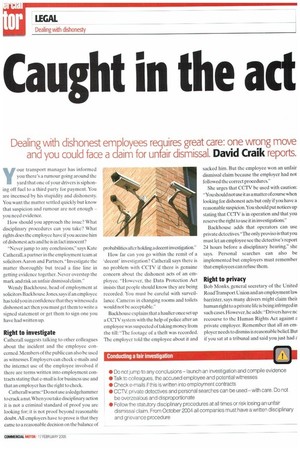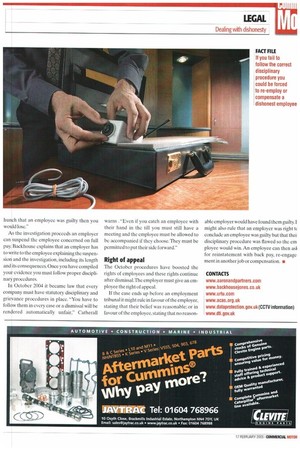Caught in the act
Page 40

Page 41

If you've noticed an error in this article please click here to report it so we can fix it.
Dealing with dishonest employees requires great care: one wrong move and you could face a claim for unfair dismissal. David Craik reports.
Your transport manager has informed you there's a rumour going around the yard that one of your drivers is siphoning off fuel to a third party for payment. You are incensed by his stupidity and dishonesty. You want the matter settled quickly but know that suspicion and rumour are not enough you need evidence.
How should you approach the issue? What disciplinary procedures can you take? What rights does the employee have if you accuse him of dishonest acts and he is in fact innocent?
"Never jump to any conclusions," says Kate Catherall. a partner in the employment team at solicitors Aaron and Partners. "investigate the matter thoroughly but tread a fine line in getting evidence together. Never overstep the mark and risk an unfair dismissal claim."
Wendy Backhouse, head of employment at solicitors Backhouse Jones. says if an employee has told you in confidence that they witnessed a dishonest act then you must get them to write a signed statement or get them to sign one you have had written up.
Right to investigate
Ca the rall suggests talking to other colleagues about the incident and the employee concerned. Members of the public can also be used as witnesses. Employers can check e-mails and the internet use of the employee involved if there are terms written into employment contracts stating that e-mail is for business use and that an employer has the right to check.
Catherall warns:"Do not use a sledgehammer to crack a nut.When you take disciplinary action it is not a criminal standard of proof you are looking for; it is not proof beyond reasonable doubt. All employers have to prove is that they came to a reasonable decision on the balance of probabilities after holding a decent investigation."
How far can you go within the remit of a 'decent' investigation? Catherall says there is no problem with CCTV if there is genuine concern about the dishonest acts of an employee. "However, the Data Protection Act insists that people should know they are being recorded. You must be careful with surveillance. Cameras in changing rooms and toilets would not be acceptable."
Backhouse explains that a haulier once set up a CCTV system with the help of police after an employee was suspected of taking money from the till: "The footage of a theft was recorded. The employer told the employee about it and sacked him. But the employee won an unfair dismissal claim because the employer had not followed the correct procedures."
She urges that CCTV be used with caution: "You should not use it as a matter of course when looking for dishonest acts but only if you have a reasonable suspicion. You should put notices up stating that CCTV is in operation and that you reserve the right to use it in investigations."
Backhouse adds that operators can use private detectives.-The only proviso is that you must let an employee see the detective's report 24 hours before a disciplinary hearing," she says. Personal searches can also be implemented but employers must remember that employees can refuse them.
Right to privacy
Bob Monks, general secretary of the United RoadTransport Union and an employment law barrister, says many drivers might claim theii human right to a private life is being infringed in such cases. However.he adds: "Drivers have tic recourse to the Human Rights Act against z private employer. Remember that all an employer needs to dismiss is reasonable belief. Sul if you sat at a tribunal and said you just had hunch that an employee was guilty then you would lose."
As the investigation proceeds an employer can suspend the employee concerned on full pay. Rackhouse explains that an employer has to write to the employee explaining the suspension and the investigation, including its length and its consequences. Once you have compiled your evidence you must follow proper disciplinary procedures.
In October 2004 it became law that every company must have statutory disciplinary and grievance procedures in place. "You have to follow them in every case or a dismissal will be rendered automatically unfair," Catherall warns . "Even if you catch an employee with their hand in the till you must still have a meeting and the employee must be allowed to be accompanied if they choose. They must be permitted to put their side forward."
Right of appeal
The October procedures have boosted the rights of employees and these rights continue after dismissal.The employer must give an employee the right of appeal.
If the case ends up before an employment tribunal it might rule in favour of the employer, stating that their belief was reasonable; or in favour of the employee, stating that no reason able employer would have found them guilty. I might also rule that an employer was right tc conclude an employee was guilty but that thei disciplinary procedure was flawed so the em ployee would win. An employee can then as1 for reinstatement with back pay, re-engage ment in another job or compensation. • CONTACTS www.aaronandpartners.com www.backhousejones.co.uk www.urtu.com www.acas.org.uk www.dataprotection.gov.uk (CCTV information) www.dti.gov.uk






























































































































































































